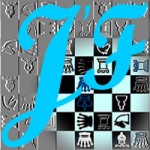Pressburger King (Super-Transmuting King): King which definitively takes up the nature of the checking piece (and thus loses his royal status). (OR: After being checked, the Super-transmuting King must immediately move like the checking piece and then losing his royal status definitively takes up his nature. When no such move is available, the ST-King side parries the check normally. If the checked King cannot move, it is a mate.)
Transmuted King: a King in check moves only in the manner of the checking piece. When not in check, such a King moves normally.
Magic Kings (mK): These cause the immediate change of colour of any piece they come into contact with or observe again from a different direction. This colour-change happens to pieces of either colour regardless of which side has made the move, which means that a piece entering the King`s field changes colour on arrival. Any pieces newly observed by two Magic Kings at once retain their own colour, as do Magic Kings themselves.
Einstein chess: all units (Ks excluded) change their type when they move, according to a precise pattern. For non-capture moves: Q>R, R>B, B>S, S>P, P remains P. For capture-moves: R>Q, B>R, S>B, P>S, Q remains Q.
Circe Parrain: after a capture, the captured piece is reborn only after another piece of its own side has moved. The line between capturing square and rebirth square is parallel with and of same direction and length as the move of this other piece. Pawns can be reborn on first and eighth rank. From their own base rank, they may move one-step; if reborn on the promotion rank, the Pawn at once promotes, the Pawn side determines the promotion piece.
PWC: When a capture is made, the captured unit (except a King) is replaced on the square the capturing unit just leaves. A Pawn is immovable on its 1st rank.
Superpawn(SP): Moves straight forwards and captures diagonally forwards through as many empty squares as desired. Promotion is normal.
Parry series-mover (pser-H#/=): differs from a standard series-mover prior to the last move as follows: the series-side may give check during the series; when checked, the idle-side must immediately parry the threat; a parry-move may be helpful or defensive, depending on the problem-type; after a check-and-parry, the series-side continues the series.


 No.1102-1104
No.1102-1104 